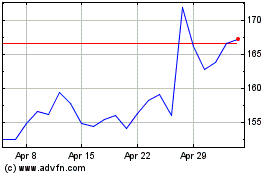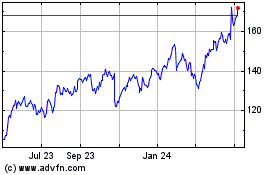By David Uberti
Months after a burst of optimism about the potential for
technology to help track the spread of Covid-19, a hodgepodge of
mobile phone apps around the U.S. has yielded unclear results amid
inconsistent policies and usage.
Ten states and Washington, D.C., have launched apps that notify
users of exposure to infected people through a development
framework built by Alphabet Inc.'s Google and Apple Inc. Eleven
more are either piloting or building such tools.
But the lack of a national strategy -- unlike in many European
countries that have adopted such apps -- adds a hurdle to making
sure the tools work across state lines as case counts tick upward,
tech and public health experts say.
"If you're going to have a lot of jurisdictional boundaries that
cut through this, it will naturally make the system less
effective," said Eric Rescorla, chief technology officer of Mozilla
Corp.'s Firefox web browser.
Advances in the Bluetooth-based Google-Apple system in recent
months have reduced the cost for states to opt in, and created a
central server to store anonymized markers of positive tests for
when phones cross state lines.
Some state governments also are collaborating to roll out tools
they see as a useful addition to a disease-fighting tool kit that
includes mask wearing, social distancing and traditional contact
tracing through phone calls and other manual outreach.
California, Oregon and Washington last month announced pilot
programs for apps on the Google-Apple system. Pennsylvania and
Delaware last month launched apps created by Irish developer
NearForm Ltd., which has built tools for several European
countries. New York and New Jersey unveiled NearForm-made apps this
month.
"You have a lot of cross-border travel," said Larry Schwartz,
who led New York's app push on the state's Covid-19 task force. "We
have people from New Jersey who work in New York, and vice
versa."
About 1.2 million people have downloaded the NearForm apps
across New York, Pennsylvania, New Jersey and Delaware, according
to the company and state officials.
In Delaware, about 10% of people who test positive in the state
report that they have downloaded its app, said Molly Magarik,
Department of Health and Social Services secretary. More than 80%
of those users say they accepted a six-digit code that verified
their test result and allowed their phone to send notifications to
other devices, she said.
Still, some public health experts remain skeptical that the apps
will push users to isolate or get tested.
"What evidence do we have that these make a difference?" said
James Thomas, a professor of epidemiology at the University of
North Carolina at Chapel Hill. "Is it a placebo for us to feel
better about what we're doing -- and feel like we have a high-tech
response -- or does it make a dent in the number of cases we're
seeing?"
In some cases, the lack of evidence is by design, said Joanna
Masel, a University of Arizona biology professor who is helping to
lead the state's app pilot program at her school and Northern
Arizona University. About 33,000 people have downloaded the app
around the university campuses, Ms. Masel said, and those who
tested positive for Covid-19 increasingly are entering verification
codes on the app. But she declined to provide specific numbers for
the latter metric.
"The reason we're not sharing information is we're really
concerned people will think it's not private," she said.
While some public health experts prefer Global Positioning
System data to aid traditional contact tracing, which tracks
people's interactions and movements, privacy experts warn it could
lead to surveillance.
The Arizona project relies on a blueprint unveiled by Google and
Apple in May using only Bluetooth-enabled alerts of users'
proximity rather than collecting GPS location data.
Apple last month rolled out an upgrade that allows iPhone users
in participating states, like Colorado, to opt into the network
without a dedicated app. The Association of Public Health
Laboratories, a trade group, also has partnered with the two
companies, as well as Microsoft Corp., to develop a central server
that stores anonymized verification codes for infected people
across the Google-Apple system. Eight states with statewide apps
and two with pilot programs have opted in so far, according to the
trade group's website.
Still, 27 states haven't launched an app or aren't actively
developing one, public health officials said. Many cited concerns
about utility, in addition to real or perceived privacy fears.
"There is much distrust around contact tracing as it is," said
Nancy Nydam, spokeswoman for the Georgia Department of Public
Health.
Attempts to use apps stalled in at least two states after they
launched GPS-based tools from local developers in the early months
of the crisis.
In April, South Dakota adopted the Care19 app built by a
developer best known for an app that connects North Dakota State
University football fans during the team's frequent national
championship runs. The state hasn't moved forward with a tool on
the Google-Apple system.
Similarly, in Utah, the Healthy Together app disabled its
location-tracking feature in July, said Jared Allgood, co-founder
of Twenty Holdings Inc., the app's developer. The company, which
previously built an app called Twenty marketed as a tool to help
"real friends" meet up in "real life," remains in talks with Google
and Apple to jump to their system, a spokeswoman said.
Healthy Together, which has more than 94,000 users in Utah, has
shifted away from trying to track the virus and toward surveying
symptoms and relaying test results, Mr. Allgood said.
"We were early," he added. "For everybody, it was their first
pandemic."
Write to David Uberti at david.uberti@wsj.com
(END) Dow Jones Newswires
October 21, 2020 05:44 ET (09:44 GMT)
Copyright (c) 2020 Dow Jones & Company, Inc.
Alphabet (NASDAQ:GOOGL)
Historical Stock Chart
From Mar 2024 to Apr 2024

Alphabet (NASDAQ:GOOGL)
Historical Stock Chart
From Apr 2023 to Apr 2024
